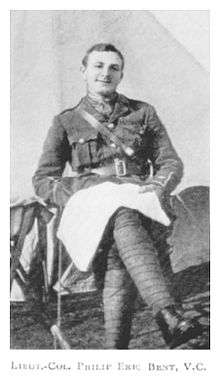Philip Bent
Lieutenant Colonel Philip Eric Bent VC, DSO (3 January 1891 – 1 October 1917) was a Canadian British Army officer recipient of the Victoria Cross, the highest and most prestigious award for gallantry in the face of the enemy that can be awarded to British and Commonwealth forces.
Philip Eric Bent | |
|---|---|
 | |
| Born | 3 January 1891 Halifax, Nova Scotia |
| Died | 1 October 1917 (aged 26) near Polygon Wood, Zonnebeke, Belgium |
| Allegiance | |
| Service/ | |
| Years of service | 1914–1917 |
| Rank | Lieutenant Colonel |
| Unit | Leicestershire Regiment |
| Battles/wars | World War I |
| Awards | Victoria Cross Distinguished Service Order |
Biography
Bent was born on 3 January 1891 in Halifax, Nova Scotia and was educated at the Royal High School, Edinburgh and Ashby Grammar School, Ashby de la Zouch. He joined the training ship HMS Conway in 1907. He served two years as a Cadet and then went to sea. He was taking his Merchant Navy officer's ticket when the war broke out in 1914.[1]
He and a friend joined a Scottish regiment "for a bit of fun" as the war was anticipated to be over by Christmas. He was commissioned in the Leicestershire Regiment in November 1914.[2]
Bent was awarded the Distinguished Service Order in the 1917 Birthday Honours.[3]
He was 26 years old, and a Temporary Lieutenant Colonel in the 9th Battalion, The Leicestershire Regiment, British Army during the First World War when he performed the deed for which he was awarded the VC on 1 October 1917 east of Polygon Wood, Zonnebeke, Belgium. He was killed whilst leading a charge. His citation reads:
For most conspicuous bravery, when during a heavy hostile attack, the right of his own command and the battalion on his right were forced back. The situation was critical owing to the confusion caused by the attack and the intense artillery fire. Lt. Col. Bent personally collected a platoon that was in reserve, and together with men from other companies and various regimental details, he organised and led them forward to the counter-attack, after issuing orders to other officers as to the further defence of the line. The counter-attack was successful and the enemy were checked.
The coolness and magnificent example shown to all ranks by Lt.-Col. Bent resulted in the securing of a portion of the line which was of essential importance for subsequent operations.
This very gallant officer was killed whilst leading a charge which he inspired with the call of "Come on the Tigers."
He has no known grave and is commemorated on the memorial wall at Tyne Cot Cemetery, Belgium.[5] In 2015 a new road in Ashby de la Zouch was named "Philip Bent Road"; this is located approximately 0.6 miles west of the town centre off Moira Road (B5006).
Bent's sword is displayed in All Saints Cathedral in his hometown of Halifax.[6]
The medal
His Victoria Cross is held by his old school Ashby School but loaned to the Royal Leicestershire Regimental Museum (now part of Newarke Houses Museum). The school proposed to auction his medals to raise funds for a sports pavilion, a decision which received widespread criticism. In May 2016 the school was unable to prove ownership.[7] In 2018, a pavilion is set to be built following a funding bid to the Healthy Schools initiative.
See also
References
- "Victoria Cross.net". Archived from the original on 24 July 2011. Retrieved 10 November 2009.
- "No. 28992". The London Gazette. 1 December 1914. p. 10196.
- "No. 30111". The London Gazette (Supplement). 1 June 1917. p. 5468.
- "No. 30471". The London Gazette (Supplement). 8 January 1918. pp. 722–723.
- Bent, Philip Eric, Commonwealth War Graves Commission
- Paul Berman, "'Come on the Tigers!': New book hails Halifax-born war hero," CBC News 11 November 2017; HMHPS Historical Paper No 2: "Philip Bent - Halifax’s VC", Halifax Military Heritage Preservation Society, (John Boileau, Chair) 2016; Boileau, J. (2005). Valiant Hearts. Halifax. Nimbus Publishing. p. 103
- Mack, Tom (1 May 2016). "No movement in Ashby School's bid to sell war hero's medals" (Leicester Mercury). Retrieved 24 April 2017.
- Monuments to Courage (David Harvey, 1999)
- The Register of the Victoria Cross (This England, 1997)
- VCs of the First World War - Passchendaele 1917 (Stephen Snelling, 1998)